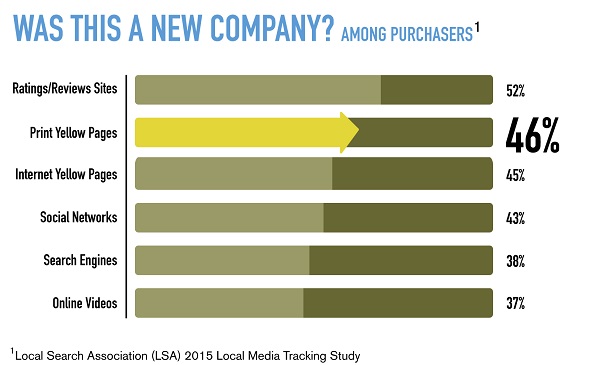By Andrew Carlson
In the age of smartphones, tablets, and e-readers, we forget that print has a place and purpose in our digitally transformed society. Demographics, personal preferences, and the complementary nature of online and print advertising explain why print plays a key role in consumer path to purchase. At a time when ‘Buy Local’ is a national mantra, businesses serving a local clientele should carefully consider the benefits of advertising in local print directories.
Start by considering what you know about your customers; study their communication and purchasing habits and preferences. Then, analyze the most popular paths to purchase for your service or product. It’s important to remember that not everyone is comfortable making large purchases or service arrangements online and that multiple sources are frequently used to fully research major purchases. A significant percentage of digital-enabled consumers prefer the functionality, familiarity, and reliability of printed directories, especially for certain kinds of searches. In fact, when it came to researching purchases, the Yellow Pages print directory ranked higher than all online and offline information sources by shoppers in the following categories: Home Improvement Services; Healthcare Services; and Legal, Financial & Insurance Services. (Source: The Why Before the Buy Thrive Analytics 2016).
The Local Media Tracking Study (LMTS), published annually by the Local Search Association, analyzes consumer media usage for product and service searching. The data affirms that printed directories are one of the top trusted sources for accurate local business information, along with search engines, company web sites, and word of mouth. As expected, the Yellow Pages printed directory has lower reach than digital sources, and yet it’s the search marketing channel most likely to lead to a contact or purchase.
The LMTS shows that the printed Yellow Pages tops the chart when it comes to consumers taking action post-search. The percentage of people who made a contact with the business, visit or purchase after their search is highest for printed Yellow Pages (71%), surpassing that of Search Engines and Online Videos. In fact, half of those users made a purchase that same day! And consumers aren’t only looking up businesses they already patronize: of those who used the printed Yellow Pages and made a purchase, 46% were purchasing from a company new to them.

Another set of LSA data on how consumers search for various local businesses shows that when consumers are ready to make a sizable or time-sensitive purchase that is complex or especially personal, they seek local experts in a printed directory. By the time they pick up a directory, they are ‘deeper in the funnel’ and close to the last step in their decision-making process; they have an immediate need, or an unfamiliar one; need to purchase soon and looking for a bit of education.
Businesses that match these search criteria include auto repair, funeral homes, caterers, doctors and dentists, vets and groomers, appliance and computer repair, and contractors of all types (e.g., plumbers, roofers, landscapers, painters). It’s not hard to imagine a scenario where reaching for your Yellow Pages makes perfect sense. When your plumbing is backed up and threatening to make a huge expensive mess, you don’t want to sort through an auto-generated list of businesses that may not be local, updated, or accurate. You want to glance at a large, well-designed page of ads where you’ll recognize the logo of the service you used last time, or that you’ve seen on trucks in your neighborhood.
In similar fashion, small businesses want to work with dedicated consultants with regional experience, not online widgets or random agents at a faraway call center. Small businesses need to know their customers well. They value the know-how of advertising channels, such as local directories, that offer local ad networks and representatives. Many businesses depend on a steady source of lead generation to sustain a healthy volume of clients. Placing eye-catching ads in printed directories is an effective way to increase phone inquiries. A Florida-based law practice, Ward & Barnes, indicates that approximately one third of the calls the firm receives are generated from yellow page ads. This is significant given that the firm advertises with approximately seven or eight different sources.
Other entrepreneurs cite the importance of working with an advertising rep that can help them find the most impactful, cost-effective blend of online and print advertising for their multi-faceted service businesses. The owner of Connecticut-based Service Station Equipment appreciates that the regional ad mix he developed in consultation with his rep targets his distinct markets effectively, seamlessly adjusts to seasonal demands, and maintains strong brand awareness without demanding much time or effort from him. He is able to generate leads efficiently, reaching the right customers at the right time.
LMTS data backs up the successes experienced by these entrepreneurs. The printed Yellow Pages are most effective (surpassing even search engines and online videos) at compelling potential customers to take action after searching for a product or service. After seeing a printed directory ad, 69% of consumers made contact with the business by phone, 35% visited in person, 28% checked out their web site, and 15% sent an email inquiry.
Marketing strategies that integrate printed ads with social media, digital display, and other channels yield stronger results by reinforcing and enhancing brand awareness, and targeting potential customers where and how they prefer to search and shop.
Smart entrepreneurs will keep experimenting and developing strategies to find the most effective ways to engage with their audience. Tracking results and soliciting feedback helps small business owners continuously improve these interactions and fine-tune their ad campaigns. To stay competitive, don’t rely solely on the latest trend—tried and true methods still hold a lot of appeal for customers and business owners alike.
Andrew Carlson is executive director of product management at Print Media, LLC which publishes and distributes the YPSM-branded print directory that consumers use to find quality products and services in their areas. @YP.
@YP







